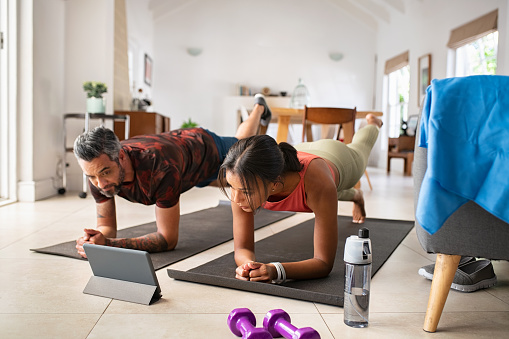Self-care during a Pandemic
Remember waking up at 6 am, your mom screaming at the top of her lungs that you’ll be late yet again if you don’t wake up within the next 10 minutes? Do you recall staying up late completing assignments, depending on coffee to help get through the night, while praying that your turn to present doesn’t come the next day? Can you recollect making impromptu lunch plans after school, even when the first period hasn’t started? All these memories come floating back as we think of 2019 and life we now term as ‘pre-Covid’ times.
Our lives have been forever changed by the coronavirus pandemic. The pandemic presents an unprecedented challenge to public health, food systems and overall lifestyle in general. The economic and social disruption caused by the pandemic is devastating: millions of people are at risk of falling into extreme poverty, while the number of undernourished people have drastically increased. Several enterprises face an existential threat, with nearly half of the world’s global workforce at risk of losing their livelihoods. Workers in the informal sector are particularly vulnerable because the majority of them lack social protection and access to good quality health care and access to productive assets. Without the means to earn an income during lockdowns, many are unable to feed themselves and their families. For most, no income means no food, or, at best, less food and less nutritious food.
Being a school student can sometimes be challenging, but the COVID-19 pandemic has made getting an education, and life in general, even more difficult for young people. With schools, colleges and universities closed, lessons are being held remotely. All sports, school activities, and events have been canceled. One has to rely on messaging and video calling in order to sustain friendships and relationships.
Most students were reported saying that by the end of a school day , they would be exhausted – mentally as well as physically – and as a result of which they didn’t face much trouble falling asleep. Now, it’s the complete opposite. Attending online lectures doesn’t seem as tiring, lengthy and mentally draining- resulting in less sleep at night, and irregular wake up timings. As a result, many students are late for classes.
Overall, it’s quite tough to say that online classes are as interesting as they were in person. While there might be a difference in terms of the workload received, it has been noticed that it was comparatively simpler to stay active during classes while in school, since there was more face to face interaction. However much we try, it has been established that online classes cannot replace school. The joy of being able to spend time with friends and learn in person is a different experience in itself-one that every child should get an opportunity to be a part of. During these times, the immense lack of communication with friends, teachers and our loved ones in real life is not entirely unbearable, but indeed very difficult.
For those working, be it in the corporate or academic sector, life has changed drastically. Most office goers depended on metros, buses and trains for their daily commute. Looking back, they say that it feels surreal to even imagine being that close together, holding the train pole or staircase handrail with bare hands. Previously used to traveling and jostling, packed like sardines, it is impossible to even think about traveling without wearing a mask and gloves, standing at least 6 feet away from others.
COVID-19 has been stressful for most of us, greatly impacting our mental health and well-being. We have missed trips, celebrations, graduations and instead are at home working, learning and staying locked down with our families. Social distancing can be tough, which is why it’s important to take care of our mental health during this time. During such unprecedented times, many things can get in the way of us taking care of ourselves, including family caregiving responsibilities, work, social commitments, and more. But, ultimately, when we do take care of ourselves and our needs is when we’re best able to show up for all of the other people and responsibilities in our lives.
A simple yet effective self-care routine is a great way to care for ourselves when life feels overwhelming. What’s most important is having a routine that works for us and our mental health. “Self-care is not selfish,” explains Christine Carter, PhD, a sociologist and senior fellow at the Greater Good Science Center at the University of California in Berkeley. Focusing on what makes us feel nourished and what gives us meaning helps us ease feelings of stress and anxiety and gives us a more solid foundation, she says.
Self-care can be whatever we want or need it to be. The best part about a self-care plan is that it’s our plan, and nobody else’s. Given below are just a couple of tips that can help one practice self-care:
- Getting enough sleep - When it comes to taking care of your health and well-being (adults usually need seven to eight hours of sleep each night). sleep is pretty much always part of the answer. Getting enough good-quality sleep keeps our immune system running at its best to fight off infections. Indeed: There are parts of the body’s immune response that happen only during sleep. According to studies conducted by scientists, sleep is also one of the top ways we can help keep stress in check, as sleep deprivation can make us more sensitive to the effects of stressors ramping up our reactions (or overreactions). Finally, the brain needs sleep to function; without it you’ll be less patient and focused, make poor decisions, and be more moody, irritable, and emotional. Thus, if you find that you are struggling to fall asleep or stay asleep, try limiting technology use (mainly the smartphone in this case) prior to bed and having a consistent night routine that is not erratic in fashion. Having a cup of (decaffeinated) tea and reading are great ways to wind down and signal your brain that it’s time to get ready for bed.
- Work it Out - Exercise is as good for our emotional health as it is for our physical health. It leads to an increase in serotonin levels, while releasing a hormone called endorphin that makes you feel good, leading to improved mood and energy. Choose something you enjoy — this can be anything from running around with your kids or playing fetch with your dog, to lifting weights or practicing yoga. Spending a lot more time at home does not mean you get to be lazy. Staying active keeps your risk of chronic health issues down and lowers your chances of contracting acute illnesses, boosting your sense of well-being. Staying physically active also lessens the risk of mood disorders, increases energy, and improves mood overall.
- Eat Right - Are you now spending your days within eyeshot or arm’s reach of your snack drawer? Rather than self-impose strict rules on foods that are off limits, you can try intuitive eating. This is different from maintaining a diet - it’s a way of eating that’s all about giving your body WHAT it needs WHEN it needs it. Intuitive eating doesn’t restrict any specific foods or require you to count calories. It’s a practice in which you listen to your body and pay attention to what you need in the moment. You only eat when you feel hungry, and you stop eating when you feel full. In this case, Instagram can prove to be an inspiration. It’s obvious that we need food to survive, and taking time to prepare a meal that satisfies your taste buds and is good for you is definitely one way to practice self-care. Past research has found that cooking can be therapeutic, meeting some of our fundamental needs, like giving us a sense of agency, belongingness, and connectedness — allowing us to freely express our creativity. Savor the experience, before beginning to savor the food you made.

- Create a “no” list - Self-care doesn’t necessarily have to be an action item. It can be about freeing up space in order to make time for things that matter in your life, removing those that steal your energy. After an especially draining day, it’s good to take a few minutes to reflect: What dragged you down? How can you do less of that? Go ahead and physically write down a “don’t do” list, something that can serve as a reminder that holds you accountable. These kinds of lists help you get unstuck, helping you make adjustments until you’re doing more of the things that perk you up.

- Be kind to yourself - This is perhaps the most important. Since you spend maximum time with yourself, it is important to make sure that your relationship with the person in the mirror is a positive one. This is something you can practice by simply saying you’re proud of yourself that day. A major aspect of self-care is the “self” part, and that includes how you view yourself and, importantly, the language you use when talking to yourself. Appreciate the small tasks you do during the day and remember to tell yourself that you have done well, irrespective of the type of task. Celebrate your daily successes with positive self-talk. It might feel weird at first, but over time, your brain will adopt that self-care goodness, helping you to turn your thoughts and feelings in a happier direction. A fun and interesting way to practice positivity is to adopt a technique known as ‘positive pen’. Choose a pen at random and designate it is your “magic” pen that you will use only for writing positive things. While this might sound strange, it is a method that can help people change their mindset in a positive way, and is worth giving it a try in case it works. Creating powerful connections with objects — be it your favorite toy as a kid or a memento from a special trip -- can help assign positive connections just by “assigning” a significant attribute to that object and using it in a different way. A good way to start using your new magic pen is by writing a love note to yourself.
It feels good to take care of yourself and do things you enjoy so don’t be afraid to ask for help if you need it. Getting support from a mental health professional or someone you trust is also self-care, and you deserve the support. During times of uncertainty, it is imperative that we prioritize our mental health and implement self-care and coping mechanisms that make every day a little bit easier.
About The Author
Anusha Chakrabarti , Member of the PsyCreative Column
Psychology Committee, SDSOS, NMIMS
The author is an 18 year-old girl currently pursuing Applied Psychology at a reputed university in Mumbai, India. She was drawn to Psychology early on as it dealt with the workings of our brain and cognitive processes and its impact on human behavior, personalities, attitudes and mental and physical well-being. Through her blogs, she aims to talk about her perspectives on the subject.
Her other interests include singing - she is a trained Hindustani classical singer and loves taking part in debates and extempore. Interacting with different people and listening to their ideas and views is something that she personally finds quite enriching. She also enjoys reading books, listening to music and watching movies. Being an animal lover, her favorite pastime is playing and spending time with her little puppy at home.
Image Source: Unsplash, Pixabay





Comments
Post a Comment